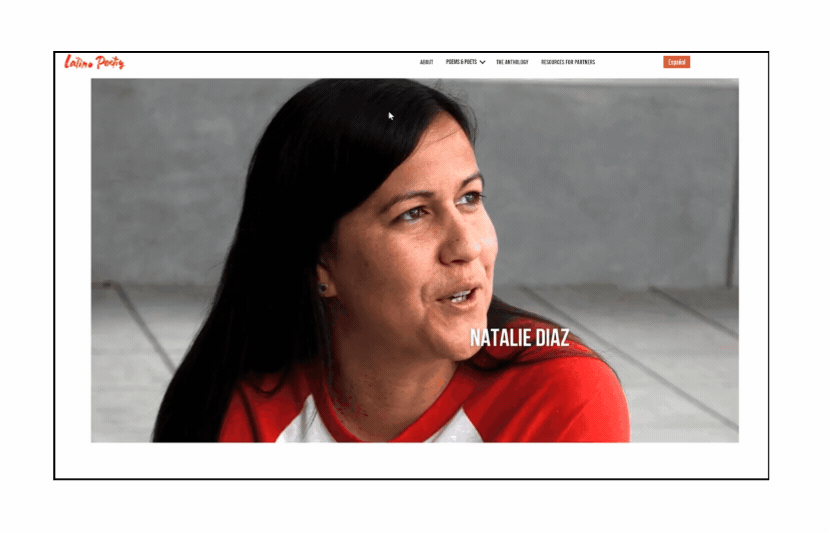
U.S. Poet Laureate Ada Limón gives a reading on latinopoetry.org.
As Library of America’s Latino Poetry: Places We Call Home initiative nears its official launch in September, we’re thrilled to reveal the new latinopoetry.org, featuring videos, essays, poems, and the Latino Poetry Reader, a free, downloadable companion to the forthcoming Latino Poetry: The Library of America Anthology (now available for pre-order).
To explore our growing archive of readings and commentary from leading figures in the world of Latino poetry, including U.S. Poet Laureate Ada Limón, just click the tabs under Poems & Poets.

Click the tabs under Poems & Poets to explore the rich world of Latino poetry through readings, commentary, essays, and more.
In addition to Limón’s discussion of Natalie Diaz’s dreamlike, humorous, and poignant vision of the beginning of the world in “Tortilla Smoke,” don’t miss Darrel Alejandro Holnes on spirituality, identity, and desire in his lush and sensuous poem, “Cristo Negro de Portobelo,” as well as readings and interviews with such luminaries as Martín Espada, José Olivarez, Rio Cortez, Deborah Paredez and Urayoán Noel. You’ll also find a wealth of bilingual and Spanish-language media and resources.
Stay tuned in the coming weeks for more info on public programs planned in seventy-five libraries and cultural organizations nationwide and six major launch events in New York, Chicago, San Antonio, Los Angeles, Miami, and San Juan.
About the Project
For nearly five centuries, the rich tapestry of Latino poetry has been woven from a wealth of languages and cultures. With distinctive rhythms, lyricism, and candor, and nuanced understandings of place, history, and origin, Latino poets have brought dazzling insight to what it means to make a home in America.
Recognition of the beauty and power of this tradition has grown in recent years, with Latino poets receiving two national and twelve state Poet Laureateships, two Pulitzer Prizes, and three National Book Awards. At the same time, the perennial questions confronted by Latino poets—of exile and belonging, language and identity, struggle and solidarity, and labor and landscape—have become ever more urgent.
What does Latino poetry reveal about America? How might it help us imagine a more just, joyful, and capacious future? Latino Poetry: Places We Call Home seeks to foster nationwide conversation on this vital literature through a groundbreaking new anthology edited by Rigoberto González, events around the country, an online media archive, and a wealth of library resources meant to spur in-depth reflection and discussion on key figures and themes.
Latino Poetry: Places We Call Home is directed by Library of America and presented in partnership with the National Association of Latino Arts and Cultures; the Academy of American Poets; Cave Canem; Poetry Society of America; the National Book Foundation; and public libraries, museums, and arts organizations around the country. Major funding for the initiative is provided by the National Endowment for the Humanities and Emerson Collective.



